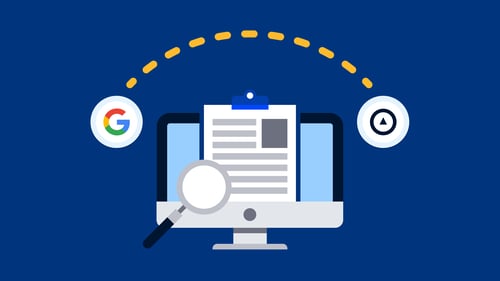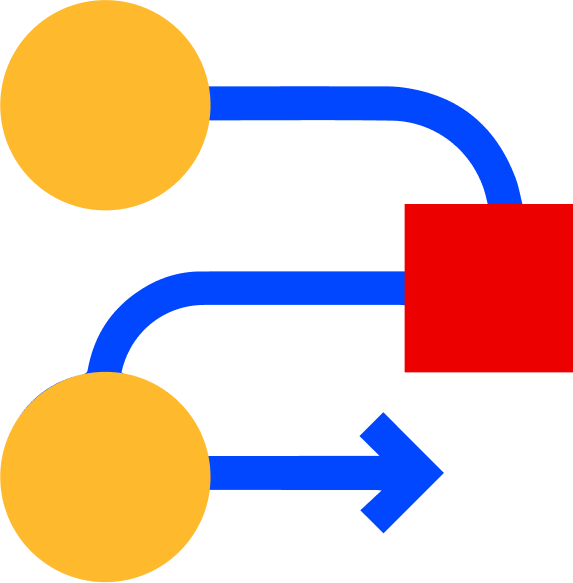Simplifying eDiscovery: 5 ways Onna's Google Workspace connector boosts productivity

Managing data in Google Workspace can present distinct challenges, especially when it comes to data collection, preservation, and legal compliance. But with the right tools and strategies, organizations can effectively overcome these hurdles while simultaneously reducing their review expenses.
Overcome eDiscovery challenges with Onna’s Google Workspace connector
Google Workspace, formerly known as G Suite, brings together Google's web-based communication and collaboration tools into one single product. For many organizations, this involves hosting an extensive volume of enterprise data on Google Drive. However, the limited control offered by Google Vault can lead to complex workflows and an elevated risk of overcollection. Inefficient management of these aspects can subsequently trigger spiraling costs and protracted review cycles.
Fortunately, Onna provides a seamless and secure connection to Google Workspace's API through a no-code connector, facilitating integration with an organization's Gmail, Drive, and Shared Drives. The use cases outlined below highlight how Onna empowers customers to tackle their Google eDiscovery challenges with ease:
1. Advanced collections
Collection is a key stage in the eDiscovery process. When done right, it offers many benefits:
- Efficiency: A good data management platform (DMP) can make your collection process smoother, save you time and money, and cause less disruption to your daily operations.
- Accuracy: A reliable DMP collects and preserves all relevant data in a defensible manner, ensuring the integrity of the discovery process and preventing potential sanctions or legal challenges.
- Scalability: A robust DMP is essential for managing large amounts of data, offering advanced search and analytics capabilities as your data volume and complexity increase.
- Compliance: The right platform ensures all data collection activities are compliant with legal and regulatory requirements, like data privacy laws or industry-specific regulations.
A data management platform enables eDiscovery professionals to collect and manage data more effectively while minimizing risk and ensuring compliance with legal and regulatory requirements.
But, collecting Google Workspace data has its own set of specific challenges. You’ll likely use Google Vault as your primary method for data management. However, it's crucial to know its limitations, as they can affect your ability to manage data and carry out eDiscovery efficiently.
The problem: Single-source data collection creates blind spots in the eDiscovery process
One major limitation with Google Vault is that it only lets you view data from one source at a time. This means double work in identifying data from multiple sources, costing you more time, effort, money, and increasing the risk of error. And don't forget about the data found in non-Google applications like Slack or Zendesk, which also goes uncollected.
Not collecting all responsive data can lead to several risks, such as:
- Sanctions.
Courts may penalize your organization with sanctions such as monetary fines, adverse inferences, or even dismissal of the case if they perceive a lack of good faith compliance with discovery obligations. - Incomplete evidence.
An incomplete data collection could lead to the omission of crucial evidence, potentially weakening your legal standing and making it more challenging to secure a favorable outcome. - Reputation damage.
Failing to collect all responsive data can harm your organization’s reputation and credibility in court, creating an impression of intentional evidence withholding or a lack of seriousness about discovery obligations. - Expensive delays.
Neglecting to gather all relevant data may result in costly delays in the discovery process, necessitating a complete redo of the collection process, leading to additional costs and wasted time.
The solution: A single, central workflow for defensible multisource collections
Onna’s Google Workspace connector provides a unified workflow for both Gmail and Google Drive, making data collection more efficient, easier, and faster. With Onna, you can collect data from all email folders, including inbox, spam, drafts, and trash. You can also capture data from archived user licenses and refine your search to specific custodians or drive folders/subfolders. Onna will soon offer the capability to collect deleted content from Gmail and Google Drive.
Additionally, Onna's functionality extends beyond Google Workspace. Given that the average employee uses over 30 cloud applications daily, Onna's capacity to gather and consolidate data from a variety of collaboration, content, and communication apps enables you to perceive the entire data landscape with ease and efficiency.
2. Advanced data processing
First, let's clarify the term 'advanced processing' in the context of eDiscovery. Advanced processing employs intricate techniques and technologies to prepare large volumes of electronically stored information (ESI) efficiently and accurately for review and analysis. It can significantly reduce time and cost associated with the review process, enabling legal teams to quickly and accurately identify crucial evidence.
Once data is collected, it must be converted into actionable information. It's essential to extract all pertinent information from your data and understand it thoroughly for successful legal workflows. Processing all common data types without issues makes data more useful and easier to find.
The problem: Incomplete metadata can compromise the accuracy and completeness of electronic evidence
Google Vault currently lacks advanced processing and automated data classification capabilities. It separates metadata from the original file, exporting it into XML files and labeling them with names and internal identification numbers. As a result, users need to reformat the data after collection to ready it for review. Vault also overlooks vital metadata during export, such as full file path descriptions, file version details, parent folder information, and document status. Since metadata is a critical search element, losing this valuable information can complicate the discovery process.
These limitations in Google Vault might force users to spend more time and resources to comprehend their data, leading to:
- Increased costs. Inefficient processing can lead to larger volumes of data for review, escalating costs related to document review, storage, and management.
- Time delays. Inadequate processing can cause delays, further driving up costs and potentially influencing legal outcomes. Delays might occur due to issues with data normalization, slow processing speeds, or other technical glitches.
- Missed relevant data. Inefficient processing could unintentionally exclude relevant data from the eDiscovery process, leading to missed opportunities to identify vital evidence and potentially negatively affecting legal outcomes.
- Data management challenges. Subpar processing could create difficulties in data management, such as issues in efficiently organizing and accessing large volumes of data. This complication can hinder effective management of the eDiscovery process and may lead to extra costs.
The solution: Powerful data processing that makes data review and production-ready
Onna actively extracts relevant information from your data, which is a key factor in streamlining your legal workflow. By effectively processing a variety of data types, including email attachments, zip files, and more, Onna ensures you gain insights from every piece of your data, rather than just surface-level information.
Additionally, Onna applies machine learning techniques such as text classification, document type, and entity extraction. In contrast to Google Vault, Onna collects metadata, including file path descriptions and access permissions. This feature helps users access the necessary information for efficient and effective discovery. As a result, you can save significant time and effort in preparing your data for review.
3. Early case assessment
Early Case Assessment (ECA) plays a pivotal role in the eDiscovery process, directly influencing the overall outcome of any legal matter. At the onset of a case, ECA facilitates the identification and analysis of key data before the formal review kicks off. It empowers legal teams to grasp the facts of the case, assess their position's strengths and weaknesses, and develop a robust strategy for the rest of the eDiscovery process.
Efficient ECA allows legal teams to achieve the following:
- Significant cost savings: By identifying vital data early, ECA reduces the overall volume of data to review. This action significantly cuts down expenses related to document review, storage, and management.
- Time efficiency: Early identification of key evidence helps teams focus only on relevant and responsive information, eliminating the need to pore over every single document.
- Improved case strategy: ECA enables legal teams to identify their position's strengths and weaknesses, allowing for a more tailored case strategy. This strategy leads to better legal outcomes and more efficient use of resources.
- Risk mitigation: Through ECA, legal teams can identify potential risks and liabilities in a case, facilitating informed decisions about settlement or trial strategy.
In the initial stage of a case, it's crucial to thoroughly evaluate legal liability and potential costs. That's why it's essential to possess robust Early Case Assessment (ECA) capabilities. These should include all the necessary functions like search, filter, tagging, and custom fields, suitable for any kind of matter. With these capabilities, users can rapidly and accurately sift through data, leading to significant time and cost savings during the review process.
The problem: Lack of ECA tools can increase your legal and financial exposure
Given that Google Vault was not designed as a comprehensive eDiscovery tool, it understandably falls short in fulfilling advanced eDiscovery requirements like ECA. Google lacks critical ECA tools such as search results filtering, custom fields, and tagging. Moreover, Google does not support cross-source searching, making data assessment a complicated, multi-step process.
Inadequate ECA in eDiscovery can result in inflated costs, time delays, overlooked relevant data, flawed case strategy, and data management difficulties. Hence, a robust and effective ECA strategy is crucial for an efficient, accurate, and cost-effective eDiscovery process.
The solution: An active repository of real-time, search-ready data
Designed with eDiscovery in mind, Onna’s Early Case Assessment capabilities encompass all the necessary functions you’d expect from a data management platform. Onna allows you to search across all your data sources simultaneously, apply custom fields, filter through your entire data set, and tag data as needed. These features enable you to cull data down to the most relevant and responsive information quickly, resulting in substantial cost savings during the review process.
4. Archive and hold
Let's clarify the concept of a legal hold for a deeper understanding of its execution. A legal hold is a mandate compelling an organization to preserve all information relevant to a legal matter. The primary goal of a legal hold is to safeguard potentially relevant data from destruction, alteration, or deletion. Legal holds can be triggered for several reasons, including investigations, litigations, or regulatory compliance.
Legal holds are integral to eDiscovery as they prevent the loss or destruction of relevant data during the eDiscovery process. Without a legal hold, data that is potentially relevant to a legal matter could be deleted or overwritten, leading to the loss of crucial evidence.
Moreover, legal holds are fundamental to upholding a defensible eDiscovery process — one that is transparent, consistent, and auditable. By implementing a legal hold, an organization demonstrates its commitment to preserving and protecting potentially relevant data, which can help evade legal and financial repercussions associated with spoliation.
What potential repercussions could arise from improper implementation of legal holds?
- Spoliation: Failure to preserve all relevant information can result in spoliation, which entails the destruction, alteration, or failure to preserve evidence crucial to a legal matter. Spoliation can invite severe legal and financial consequences, including adverse inference instructions, monetary sanctions, or, in extreme cases, criminal charges.
- Loss of credibility: A poorly executed legal hold can erode the organization's credibility involved in the matter. This can affect the trust of the court, jury, and other stakeholders in the legal process.
- Adverse legal outcomes: Failure to preserve all pertinent information can adversely impact the case's outcome. Missing or incomplete data can lead to erroneous conclusions, inadequate case strategies, and unfavorable legal outcomes.
- Financial consequences: Improper legal holds can escalate legal costs and fines associated with spoliation, adverse inference instructions, and other legal sanctions.
- Reputational damage: An incomplete legal hold can damage the reputation of the organization involved in the matter. Negative publicity and public scrutiny can inflict long-term harm to the organization's reputation and brand image.
The problem: A multipronged approach to legal holds hinders speed and consistency
Applying a legal hold within Google is not a simple one-click process. It demands multiple holds to be applied for each custodian and each data source (Gmail, Google Drive, etc.). This complexity escalates when incorporating additional data sources outside of Google.
Archiving also faces similar challenges to legal holds, where multiple workflows need to be followed to archive data in each Google application. Not to mention, Google only archives emails that have reached the inbox, excluding emails from spam, drafts, and trash folders.
The solution: Defensible one-click preservation
Onna equips customers to derive more value from archived data and seamlessly maintain cross-data source holds through a multi-source repository that supports full archives. With a single streamlined workflow, users can preserve and hold data across Gmail, Google Drive, and other data sources at the custodian level. Users can also archive complete Gmail data – including spam, drafts, and trash – and utilize a real-time repository for quicker response times. This provides legal, HR, and compliance teams with the ability to search a fully indexed and updated repository of data, granting them complete control over archived data.
5. Exporting
In the Electronic Discovery Reference Model (EDRM), the export phase involves the transfer of ESI deemed relevant and responsive, in a format ready for review by legal teams or other stakeholders involved in a legal matter. For efficient and effective reviewing, the exported data must be well-organized, searchable, and inclusive of relevant metadata.
The problem: Export limitations can compromise the integrity, usability, and accuracy of ESI
Google Vault’s exporting feature presents certain limitations that can prolong and complicate the process. For instance, when you attempt to export data from Gmail and Google Drive, you’re restricted to using either MBOX or PST formats. Additionally, you can only process exports for a single Google service at a time.
But that's not all. Vault's export formats require additional changes to get them ready for review in eDiscovery platforms. Vault also struggles to export a subset of data easily due to file control limitations and the numerous steps required to complete the process. As a result, you may end up exporting more data than necessary, leading to extended review times and increased review costs.
The solution: Customizable export options for clean and comprehensive exports
After data collection, processing, and early case assessment, the next step is exporting. Onna’s Google Workspace connector streamlines this process by allowing for an unlimited data set to be exported. It offers various export options (like near-native format, PDF format, or cloud transfer) for easy uploads to review platforms, and ensures consistent export across multiple data sources simultaneously — Google Workspace (Gmail, Google Drive), Slack, and many more.
With Onna's robust Early Case Assessment (ECA) functions, you can be certain that you're sending a much more targeted, responsive data set for review. This results in minimized review times and reduced review costs.
Get started with Onna for eDiscovery
Navigating data management in Google Workspace can present unique challenges, especially when you're juggling data collection, preservation, and legal compliance. But that's where Onna steps in. With us at your side, you can tackle these challenges head-on and even trim down your review expenses.
Imagine this: your data collections, processing, case assessments, legal holds, and even exports all supercharged and simplified. That's what happens when you bring Onna's Data Management Platform into your process.
But wait, there's more. Onna's power amplifies as you plug in additional data sources. Our out-of-the-box data connectors smoothly integrate not just with Google Workspace, but with a host of other content, collaboration, and communication apps. We're talking Microsoft 365, Slack, Zoom, and many more.
The result? You get a single view of all your unstructured data. Your capabilities in data collection, preservation, and compliance become not just stronger, but also more comprehensive and defensible than ever before. And all that with just one tool: Onna.
Learn more about how Onna can make your eDiscovery process more efficient by requesting a demo.
 eDiscovery
eDiscovery Collections
Collections Processing
Processing Early Case Assessment
Early Case Assessment Information Governance
Information Governance Data Migration
Data Migration Data Archiving
Data Archiving Platform Services
Platform Services Connectors
Connectors Platform API
Platform API Pricing Plans
Pricing Plans Professional Services
Professional Services Technical Support
Technical Support Partnerships
Partnerships About us
About us Careers
Careers Newsroom
Newsroom Reveal
Reveal Logikcull by Reveal
Logikcull by Reveal Events
Events Webinars
Webinars OnnAcademy
OnnAcademy Blog
Blog Content Library
Content Library Trust Center
Trust Center Developer Hub
Developer Hub